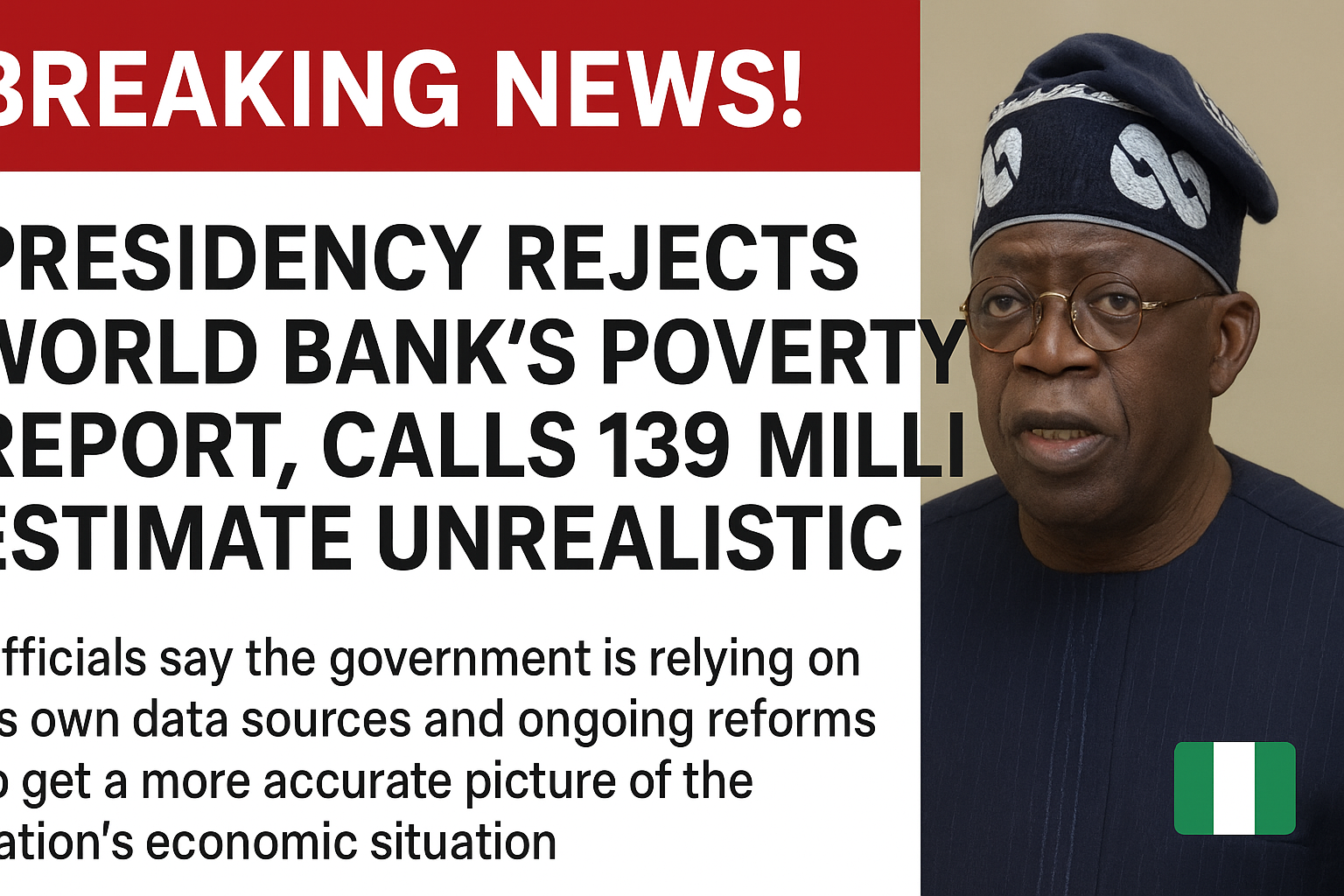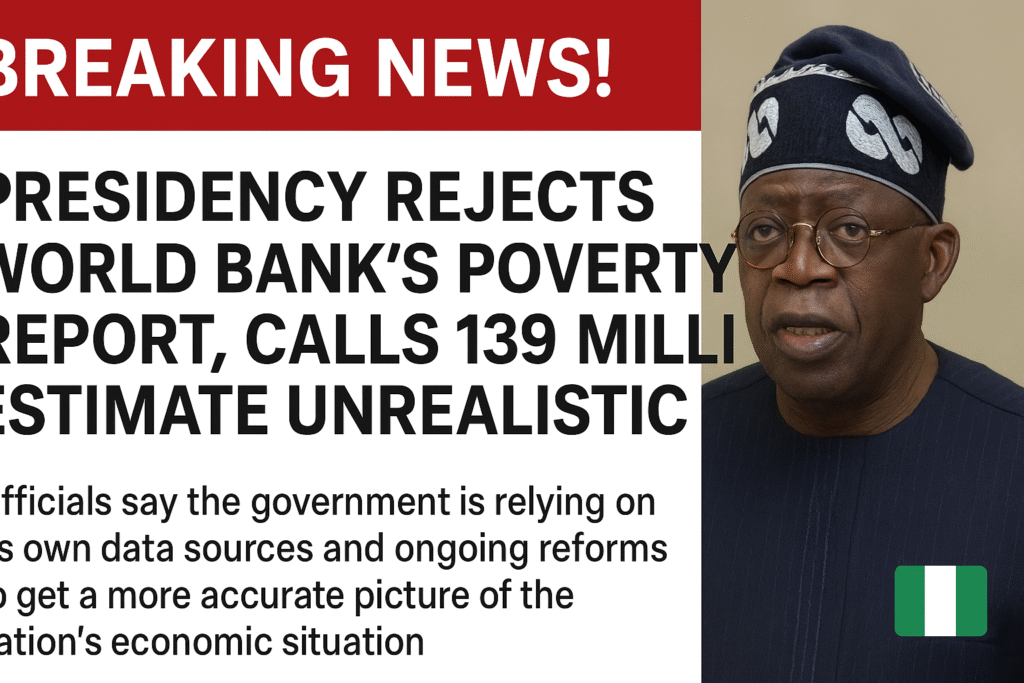

By DocuNews Central – October 9, 2025
Nigeria Pushes Back Against Global Poverty Figure
The Nigerian Presidency has officially rejected the latest World Bank report that estimated 139 million Nigerians are living in poverty, describing the figure as “unrealistic and disconnected from current national realities.”
According to the World Bank’s Nigeria Development Update (October 2025), more than 61% of Nigeria’s population—around 139 million people—are living below the international poverty line of $2.15 per day (Purchasing Power Parity).
However, government officials strongly disagree. In statements obtained by DocuNews Central and confirmed by multiple outlets including Punch Newspapers, Guardian Nigeria, and Channels TV, the Presidency said the report’s methodology fails to capture the true scope of economic activity across the country.
Presidency Says Figure “Does Not Reflect Local Realities”
The Special Adviser to the President on Media and Public Communications, Sunday Dare, emphasized that Nigeria’s economy is unique and cannot be fairly assessed by universal poverty benchmarks.
“While we respect the World Bank’s expertise, we believe their poverty estimate is not fully aligned with Nigeria’s socio-economic realities,” Dare said in a statement quoted by Punch. “Our data show that millions of Nigerians earn and consume more than what such global models assume.”
The Presidency insists that ongoing reforms—such as agricultural investment, digital financial inclusion, and job-creation programs—are beginning to yield results.
“President Tinubu’s administration is fully aware of economic challenges, but also confident that the foundations for growth and prosperity are being laid,” the statement added.
World Bank’s Report Sparks Nationwide Debate
The World Bank’s report, titled “Nigeria Development Update: Stability Amidst Hardship”, argues that despite government reforms, many Nigerians continue to face increasing hardship. The report points to rising inflation, currency devaluation, and high food prices as key drivers of poverty growth.
According to Reuters, the World Bank stated that although Nigeria’s economy has stabilized following difficult fiscal decisions, “most households have not yet felt relief.”
The Bank’s data suggest that Nigeria’s poverty rate has risen sharply from 81 million people in 2019 to 139 million in 2025, and could reach 141 million by 2026 if economic pressures persist.
But the Presidency insists these projections are out of touch with more recent local surveys conducted by the National Bureau of Statistics (NBS) and other domestic research institutions.
Government Relies on Local Data and Ongoing Reforms
Speaking to DocuNews Central, a senior government official explained that Nigeria’s National Bureau of Statistics has been updating its household income and consumption data, which will soon offer a clearer picture.
“The 2018/2019 survey that the World Bank used is outdated. The Nigerian economy has evolved since then,” the source said. “A lot has changed—especially in agriculture, trade, and services.”
The official added that the informal economy, which accounts for more than 50% of Nigeria’s GDP, is often poorly captured in global models. Many individuals earn through self-employment, small businesses, and rural trade—economic activities that don’t always appear in structured data.
“The World Bank’s poverty threshold may be fair for global comparison, but it cannot define the lived experiences of Nigerians,” he stated.
Economic Experts Offer Mixed Reactions
Economists across Nigeria have expressed differing opinions on the issue.
Some analysts agree with the government’s concerns about the World Bank’s methodology, while others say the poverty situation is still alarming and requires urgent attention.
Dr. Temitope Fashola, a Lagos-based development economist, told DocuNews Central that both sides have valid points.
“The Presidency is right that international poverty lines can sometimes exaggerate the numbers,” he said. “However, that does not mean millions of Nigerians aren’t struggling daily. Prices of essentials—food, transportation, rent—are at record highs.”
According to Fashola, the real issue is not just statistical accuracy but economic policy execution. “It’s not enough to challenge the data,” he added. “The government must ensure that policies targeting inflation, job creation, and small businesses actually reach the people.”
What the World Bank Based Its Data On
In its report, the World Bank clarified that its poverty estimate is built upon household surveys, consumption data, and predictive modeling. The Bank uses internationally accepted methods to allow comparison across countries.
The poverty line of $2.15 per day (measured in PPP) serves as a global benchmark for extreme poverty. However, it may not perfectly match national standards or purchasing power differences.
For example, in Nigeria’s informal sectors—such as petty trading or local farming—income and consumption often fluctuate, making consistent tracking difficult.
The Bank admitted that the most recent household consumption survey for Nigeria dates back several years, meaning new developments might not be fully reflected.
Still, the World Bank insists that its analysis reveals a worrying trend of deepening hardship in Africa’s largest economy, despite policy reforms aimed at stabilizing growth.
Nigeria’s Response Reflects Confidence in Economic Reforms
The Presidency argues that recent government initiatives are beginning to ease economic pain. Programs under the Presidential Economic Coordination Council (PECC), renewed agric-loans, and SME empowerment schemes are cited as evidence of progress.
In addition, the government claims the removal of fuel subsidies and exchange rate unification, though initially painful, are attracting long-term investment and will eventually lift millions out of poverty.
According to Channels TV, officials said:
“The reforms are not designed to make life harder for citizens but to build a sustainable economy. The current pain is temporary.”
The Presidency further assured Nigerians that the administration is “committed to using home-grown data and evidence-based policies to track poverty reduction.”
Citizens React Across Social Media
The World Bank’s report and the Presidency’s response have sparked an online storm. On X (formerly Twitter), citizens are debating whether the government’s rebuttal is justified or an attempt to save face.
Some Nigerians argue that the poverty figure feels “real” considering the rising cost of food, transportation, and electricity. Others believe the Presidency is right to challenge what they see as “foreign exaggeration.”
“Whether it’s 100 million or 139 million, Nigerians are struggling. Government should focus more on relief than on statistics.”
Global Organizations Watch Nigeria’s Policy Moves Closely
International observers say Nigeria’s response underscores a broader debate between local context and global measurement systems.
According to a Reuters analysis, several African countries, including Kenya and Ghana, have recently questioned international poverty metrics, arguing that they often paint overly pessimistic pictures of national economies.
The World Bank, however, maintains that global poverty measures are crucial for identifying inequalities and directing aid effectively.
Meanwhile, the International Monetary Fund (IMF) continues to urge Nigeria to maintain fiscal discipline while protecting the most vulnerable citizens.
Independent Experts Call for Collaborative Data Review
Policy experts suggest that the controversy presents an opportunity for cooperation rather than confrontation.
Dr. Ngozi Udechukwu, a public policy researcher at the University of Nigeria, Nsukka, told DocuNews Central that both the government and the World Bank could work together to reconcile data differences.
“This is not a contest between Abuja and Washington,” she said. “It’s about ensuring that poverty data reflects reality, so policies can be targeted correctly.”
Udechukwu proposed a joint poverty-mapping exercise using updated household data, satellite imagery, and digital surveys. Such collaboration could enhance accuracy and public trust in official statistics.
The Broader Implication: Trust and Transparency
Beyond numbers, the controversy highlights a deeper issue—trust in data and institutions.
When poverty estimates vary widely, it creates uncertainty about where help is most needed. Citizens may lose confidence if figures appear politicized, while international donors may hesitate to commit funds without reliable data.
For Nigeria, aligning domestic statistics with global benchmarks can strengthen credibility and attract investment. Accurate data also helps measure progress toward the United Nations Sustainable Development Goal 1 (No Poverty).
Looking Ahead: What Nigerians Can Expect
As the debate continues, experts predict that both the Presidency and the World Bank will likely revisit their data models in the coming months.
Nigeria’s National Bureau of Statistics is expected to release an updated poverty and welfare report before the end of 2025. This report will likely determine whether the government’s optimism or the World Bank’s warning is closer to reality.
In the meantime, citizens hope to see tangible improvements—lower food prices, stable currency, better access to jobs, and more social protection programs.
“We are not denying challenges,” said Sunday Dare. “We are simply saying our people deserve to be measured by realities, not assumptions.”
Conclusion: A Battle Over Numbers and Narratives
The disagreement between Nigeria and the World Bank is more than a clash of statistics—it’s a struggle over how poverty should be defined, measured, and solved.
While the World Bank seeks consistency and comparability across nations, the Nigerian government prioritizes context and local progress. Both perspectives have merit.
Ultimately, the truth may lie somewhere in between.
What remains clear is that the issue has once again drawn global attention to the complex economic journey of Africa’s most populous nation—a country determined to tell its own story.
Sources: DocuNews Central, Punch Newspapers, Guardian Nigeria, Reuters, Channels TV, Lagos Television News.
Copyright © 2025 DocuNews Central. All rights reserved.








